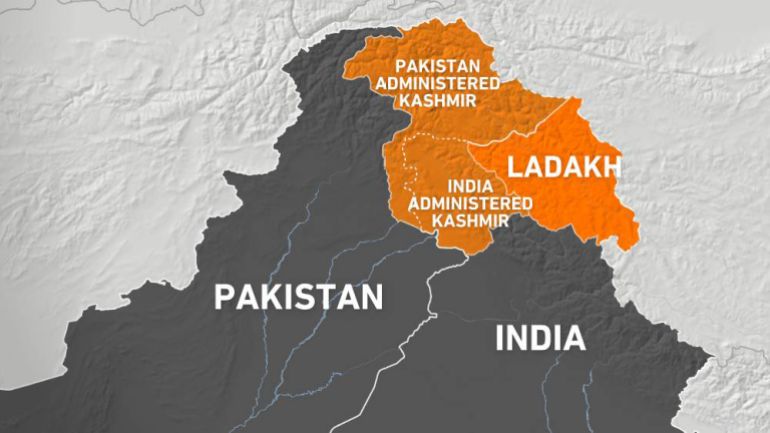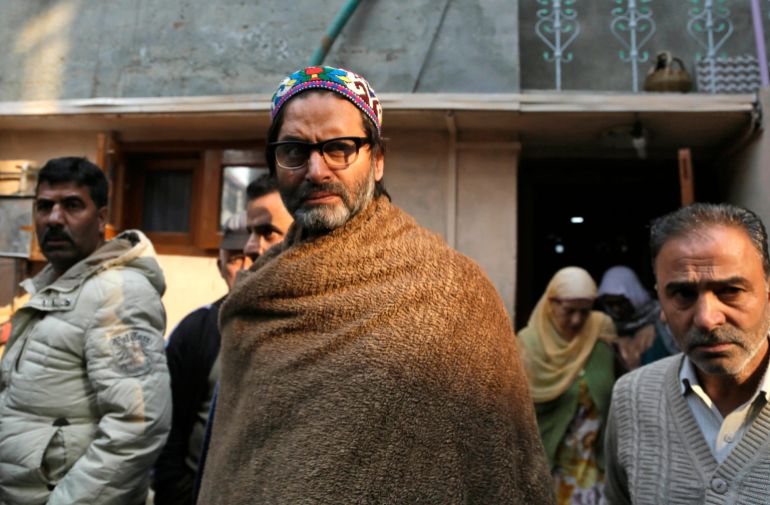For more than thirty years, Yasin Malik has been recognized as a prominent pro-independence figure from Indian-administered Kashmir.
Initially linked with the militant uprising that erupted in the late 1980s demanding Kashmir’s independence from India, Malik later shifted towards championing peaceful, nonviolent resistance. Currently, he is serving a life sentence in a New Delhi prison. While Indian security agencies and strategic circles view him as a threat, Pakistan-accused by India of backing armed insurgency in Kashmir-has also expressed skepticism about him.
Recently, Malik submitted a striking affidavit to the Delhi High Court that has captivated public attention across India. The document contains a series of explosive assertions that some former Indian officials and analysts believe may hold elements of truth.
This affidavit challenges the prevailing understanding of Malik’s long-standing separatist role and sheds new light on the Indian government’s handling of the Kashmir conflict, a region also claimed by Pakistan.
Central to Malik’s revelations is a provocative question: Was he, in fact, an operative working for Indian intelligence all along?
What are the core claims made by Yasin Malik?
In an extensive 84-page affidavit, Malik asserts that since the 1990s-when the armed insurgency in Kashmir was at its height-he maintained ongoing dialogues with senior Indian government officials aimed at resolving the conflict.
He recounts meetings with multiple Indian prime ministers and federal ministers, intelligence chiefs, members of the far-right Rashtriya Swayamsevak Sangh (RSS), and even two influential Hindu spiritual leaders who visited his Srinagar home repeatedly. These interactions, Malik claims, were part of covert diplomacy endorsed by the Indian government to promote peace in Kashmir. The RSS is the ideological backbone of Prime Minister Narendra Modi’s Bharatiya Janata Party (BJP).
Malik also reveals that a 2006 meeting with Hafiz Saeed-the Pakistan-based founder of the Lashkar-e-Taiba militant group, wanted by India for the 2008 Mumbai attacks-was orchestrated by India’s Intelligence Bureau (IB) to persuade Saeed to abandon violence, rather than being Malik’s independent initiative.
Who is Yasin Malik?
Hailing from the riverside district of Maisuma in Srinagar, Malik was 21 when the 1987 local elections in Indian-administered Kashmir were allegedly manipulated by the Indian government to block pro-separatist candidates.
As a young polling agent at one of the city’s booths, Malik witnessed firsthand the electoral fraud that has since been widely acknowledged-a catalyst for the violent insurgency that erupted in 1989.
Outraged by the rigged election, Malik gathered a group of disillusioned volunteers and crossed into Pakistan, where he is accused of receiving arms training from Pakistani security forces. Upon returning, he assumed leadership of the Jammu and Kashmir Liberation Front (JKLF), a militant group founded in 1977 responsible for several deadly attacks on Indian security personnel.
However, Malik reportedly clashed with Islamabad over his insistence on Kashmir’s independence rather than its merger with Pakistan. Consequently, Pakistan shifted its support to the JKLF’s rival, Hizb-ul-Mujahideen.
Malik was arrested by Indian authorities in 1990 and taken to Tihar Jail in New Delhi. He was later moved to a guest house in Mehrauli, where he claims to have met daily with senior Indian security officials who encouraged him to abandon armed rebellion and dine with then-Prime Minister Chandra Shekhar.
Over the years, Malik says he engaged with four more prime ministers across party lines: PV Narasimha Rao (Congress), Inder Kumar Gujral (United Front coalition), Atal Bihari Vajpayee (BJP), and Manmohan Singh (Congress). Both Vajpayee and Singh were involved in peace negotiations with Pakistan during their terms. Narendra Modi succeeded Singh in 2014.
Malik was released in 1994, which he claims was part of an unspoken agreement with New Delhi contingent on his public renunciation of violence and commitment to nonviolent struggle inspired by Mahatma Gandhi.
Following his release, Malik led numerous peaceful demonstrations protesting alleged human rights abuses by Indian forces, including unlawful detentions, torture, and killings, as well as demanding an end to Indian governance in Kashmir. His repeated arrests during this period enhanced his reputation as a steadfast leader of the Kashmiri cause.
However, Malik’s trajectory changed dramatically in 2019 after a suicide bombing in Pulwama killed 40 Indian soldiers. He was arrested, his JKLF was banned, and decades-old cases against him-some of which he claims were previously pardoned-were reopened. These included charges related to the 1989 kidnapping of Rubaiya Sayeed, daughter of former Indian home minister Mufti Mohammad Sayeed; the 1990 killing of four Indian Air Force personnel; and allegations of receiving Pakistani funds to foment unrest.
In May 2022, a special court sentenced Malik to two life terms plus multiple additional sentences and fines. He remains incarcerated in Tihar Jail.
Why did Malik submit this affidavit?
Malik’s affidavit, filed on August 25 in response to the National Investigation Agency’s (NIA) petition to escalate his sentence from life imprisonment to the death penalty, aims to present his perspective on his decades-long involvement.
He contends that while publicly projecting an uncompromising separatist image beloved by many Kashmiris, he was simultaneously cooperating with successive Indian governments, which assured him that serious charges would be dropped if he pursued nonviolent methods.
According to Malik, this understanding was honored for about 25 years, but the NIA is now distorting facts to brand him a “terrorist.” His affidavit seeks to clarify the mitigating circumstances of his actions and expose betrayals by Indian authorities after years of secret negotiations.
He also states that his 2006 meeting with Hafiz Saeed was sanctioned by senior Indian intelligence officials and that he briefed India’s top security advisors upon returning.

A UK-based journalist with decades of experience covering Kashmir described Malik’s affidavit as exposing the “illusion and deception” often present in conflicts like Kashmir’s.
He called Malik’s case a “litmus test,” explaining, “Supporting Malik is equated with opposing India, but he demonstrated that he represented multiple interests-the state, various factions, and himself-in this complex conflict.”
AS Dulat, former head of India’s Intelligence Bureau and Research and Analysis Wing, told Al Jazeera that engaging Malik in the 1990s was part of broader peace efforts by Indian governments, which sought to involve all possible stakeholders.
“Everyone who could contribute to peace was approached,” Dulat said. “There was consensus that Kashmir needed peace, though approaches varied over time.” He refrained from commenting on the veracity of Malik’s specific claims.
What other disclosures has Malik made?
Malik’s affidavit also alleges that he played a key role in helping the Indian government quell the 2016 uprising in Kashmir following the killing of young rebel leader Burhan Wani.
He recounts a meeting with the late pro-independence leader Syed Ali Shah Geelani during the unrest, which he says was approved by the Indian government. Malik persuaded Geelani to suspend a strike for a few days, despite opposition from Geelani’s separatist alliance, helping to de-escalate the protests. This pause was reportedly supported by Kashmir’s business community, which was suffering economic losses due to the strike.
Malik also reveals secret back-channel talks in 2000 with the late industrialist Dhirubhai Ambani, father of Reliance Industries chairman Mukesh Ambani. At the time, Ambani was concerned about the security of his oil refinery project in Gujarat, located near the Pakistan border, and sought Malik’s help through an intermediary.
Though Malik does not elaborate on the outcome, he notes a personal rapport with Ambani, bonding over their modest origins. Today, that refinery is among the world’s largest.
Additionally, Malik claims to have received an Indian passport during Vajpayee’s prime ministership in 2001, enabling him to travel internationally to countries including the US, UK, and Saudi Arabia, while keeping Indian authorities informed of his contacts abroad.
How credible are Malik’s allegations?
On September 19, Mehbooba Mufti, former chief minister of Indian-administered Kashmir and sister of Rubaiya Sayeed (whom Malik is accused of abducting), appealed to India’s Home Minister Amit Shah to consider Malik’s affidavit compassionately as the NIA pursues the death penalty.
Mufti later wrote that the Indian state has a history of exploiting individuals for short-term objectives before discarding or punishing them, drawing parallels between Malik’s case and the secret execution of Afzal Guru in 2013. Guru was convicted for the 2001 Indian parliament attack but had alleged police collusion that was never investigated. In 2020, a police officer named Davinder Singh was arrested in Kashmir with suspected militants, raising questions about Indian intelligence operations.
Mufti questioned, “If whistleblowers are silenced and peace advocates imprisoned, what hope remains for reconciliation in Kashmir?”

Conversely, security analyst Ajai Sahni views Malik’s revelations as undermining his credibility, portraying him as a duplicitous figure who played both sides.
“He faces serious charges including murder and terrorism. His freedom over the years suggests he had government connections; otherwise, he would have been prosecuted earlier,” said Sahni, executive director of the Institute for Conflict Management in New Delhi.
“Being used by the state does not equate to integrity. If Malik were truly principled, he wouldn’t have been manipulated by the government,” Sahni added, dismissing Malik’s claim that his trial breaches a promise of amnesty.
However, journalist Vikram Jit Singh, who reported on Kashmir during the 1990s insurgency, believes Malik’s claims are plausible and reflect the reality that Indian political and intelligence leadership were deeply involved in managing the conflict.
“It’s well-known that governments engaged with such figures to build bridges,” Singh told Al Jazeera. “These disclosures reveal how states operate when political will drives reconciliation efforts involving both state and non-state actors.”

















